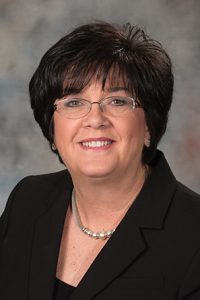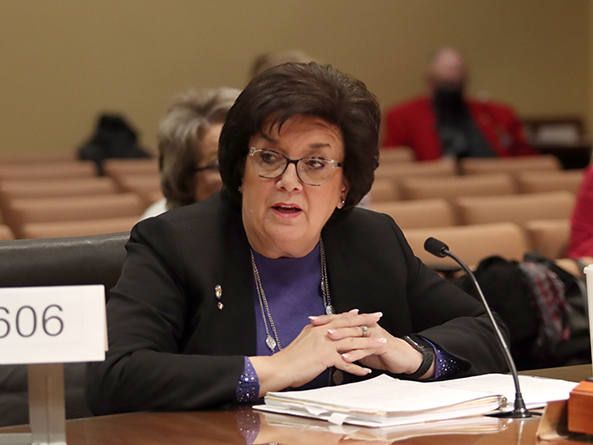Tax credit proposed for pregnancy help organizations
The Revenue Committee heard testimony Feb. 24 on a bill intended to incentivize private contributions to organizations that assist women in carrying their pregnancies to term.

LB606, sponsored by Thurston Sen. Joni Albrecht, would allow individuals, passthrough entities, corporations, estates and trusts to claim a nonrefundable income tax credit of up to 50 percent of their state income tax liability on contributions they make to qualifying pregnancy help organizations beginning in calendar year 2024.
Eligible organizations would have to provide the state Department of Revenue a written certification that they meet certain criteria. Among other requirements, an organization would have to be a nonprofit located in Nebraska that does not provide, pay for, provide coverage of, refer for, recommend or promote abortions.
The department would compile and make available a list of approved eligible charitable organizations.
The amount of credits would be limited to $10 million per year, and a single charitable organization could claim no more than 50 percent of the credits in one year.
Albrecht said LB606 would help support and expand Nebraska’s network of pregnancy help organizations, which provide services to “undersupported” pregnant and parenting women and their families.
“I believe it is one of the most important things that we can do in a time where we are also working to enable greater protections for the unborn in Nebraska,” she said.
Laura Buddenberg, former executive director of Essential Pregnancy Services of Omaha, testified in support of the bill. She said EPS provides parenting and life skills classes, financial aid and behavioral health and case management services to women during their pregnancies and up to 18 months postpartum at no cost.
She said the need for pregnancy help organizations is growing, reflected in a 36 percent increase in new client registration at EPS from 2021 to 2022.
Buddenberg said EPS is careful to tell women that its sites are not clinics and offer only medical-grade pregnancy tests and limited first trimester obstetric ultrasound services provided by licensed nurses.
Also in support was Karen Bowling of the Nebraska Family Alliance. She said the more than 25 pregnancy help organizations in Nebraska are a “bright light of compassion and care” that provide a supportive environment for pregnant and parenting women in need.
Sandy Danek testified in support of LB606 on behalf of Nebraska Right to Life. In addition to providing basic services to undersupported pregnant women, she said, pregnancy help organizations also discuss alternatives to abortion with their clients and provide counseling to women and families who suffer from negative psychological and physical effects after an abortion.
Testifying in opposition to the bill was Joey Adler Ruane of OpenSky Policy Institute. He said the proposed credit would provide a greater tax benefit to those who contribute to pregnancy help organizations than to those who donate to other nonprofits.
Also in opposition was Claire Wiebe of Planned Parenthood North Central States. Pregnancy help organizations, also called crisis pregnancy centers or anti-abortion centers, Wiebe said, restrict and manipulate the information that people facing unintended pregnancies receive.
Several Planned Parenthood patients who first visited a crisis pregnancy center reported being told that they could schedule an abortion only after receiving the results of an STI test, Wiebe said, a common tactic intended to prevent women from receiving an abortion within the legal timeframe.
She said others who received an ultrasound at a crisis pregnancy center were lied to about how far along they were in their pregnancy or told that they could receive the results of an STI test only by returning to the clinic in person.
Mindy Rush Chipman testified in opposition to LB606 on behalf of the ACLU of Nebraska. She said crisis pregnancy centers, which often are affiliated with national anti-abortion organizations and evangelical groups, are intended to look like medical clinics but rarely are staffed by medical professionals.
She said a 2022 ACLU report found that many of the organizations operating crisis pregnancy centers in Nebraska provide medically inaccurate information about abortion on their websites and use deceptive tactics to discourage or prevent people from accessing abortion care and contraception.
Erin Feichtinger testified in opposition to the bill on behalf of the Women’s Fund of Omaha. She said anti-abortion centers outnumber licensed abortion clinics in Nebraska by eight to one, and, nationally, anti-abortion centers are funded at five times the rate of health care centers that offer abortion access.
“Pregnant Nebraskans deserve compassionate health care that is free from coercive practices and based in medically accurate research,” Feichtinger said.
The committee took no immediate action on the bill.


